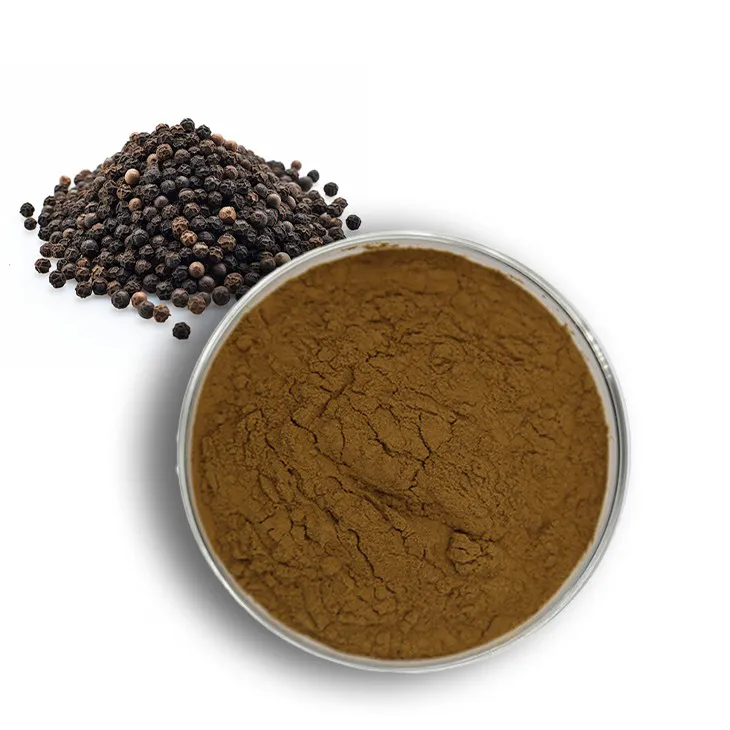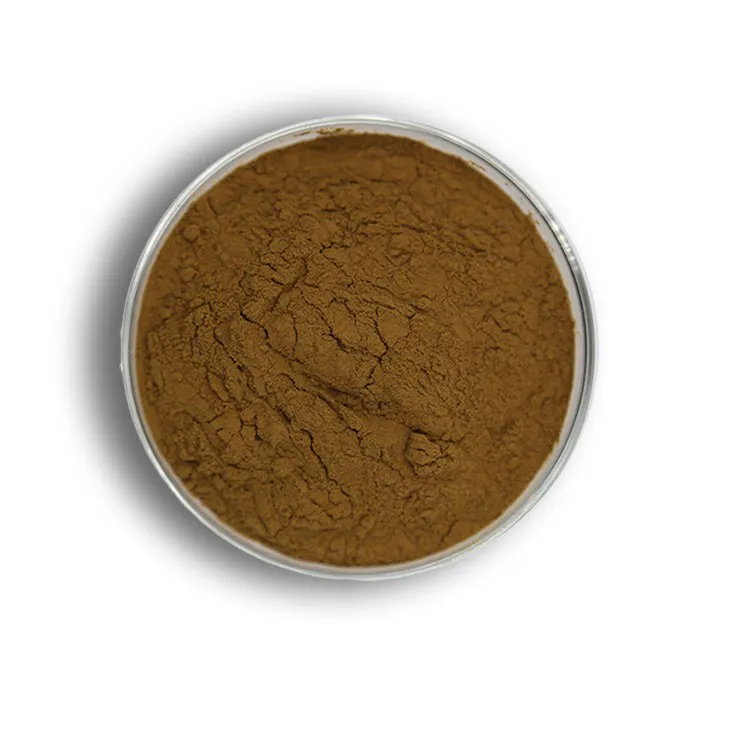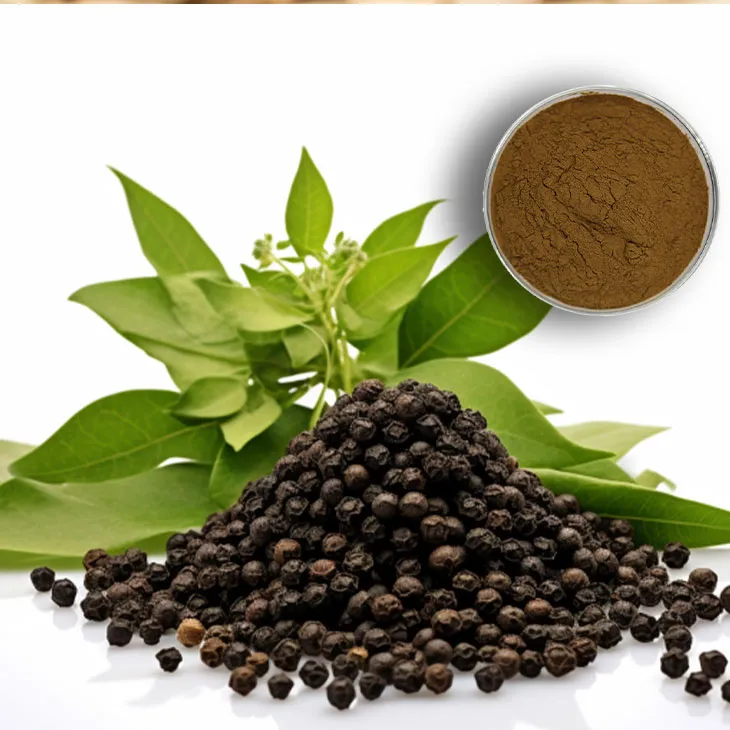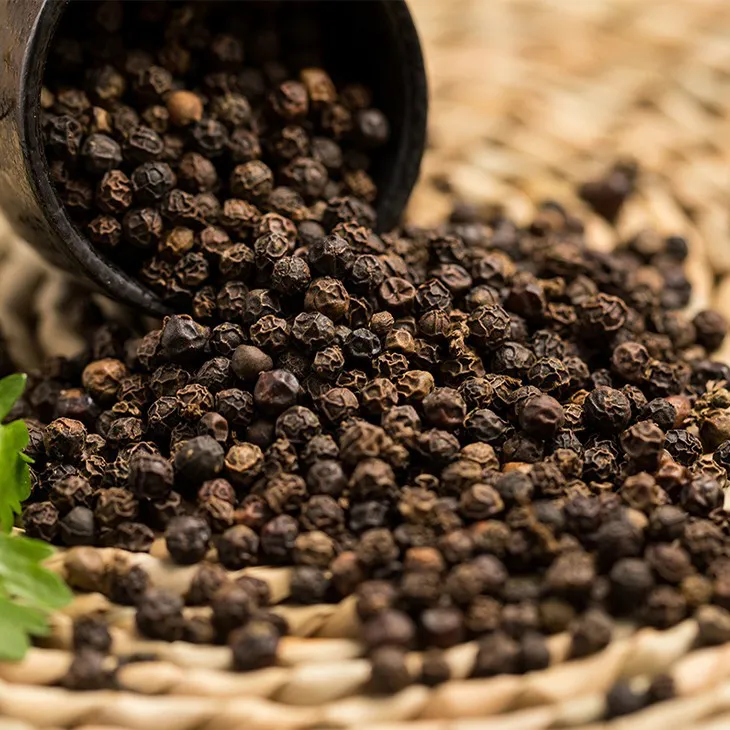- 0086-571-85302990
- sales@greenskybio.com
How to make powder with black pepper extract?
2024-11-30

1. Sourcing Black Pepper for Extraction
The first step in making powder from Black Pepper Extract is to source the right black pepper. High - quality black pepper is crucial for a good - quality extract and subsequent powder.
1.1 Selecting the Right Variety
There are different varieties of black pepper available in the market. The most common ones are Malabar, Tellicherry, and Lampong. Malabar black pepper is known for its strong, pungent flavor. It has a relatively high oil content which can contribute to a more intense extract. Tellicherry black pepper, on the other hand, is often considered a premium variety. It has a more complex flavor profile with a slightly sweeter and more aromatic note compared to Malabar. Lampong black pepper from Indonesia has a characteristic spicy flavor. When choosing the variety, consider the end - use of the powder. For example, if it is for culinary purposes where a strong, classic black pepper flavor is desired, Malabar might be a good choice. For a more refined and complex flavor in gourmet cooking or high - end products, Tellicherry could be preferred.
1.2 Checking for Quality
Look for black pepper that is whole and unbroken. Broken or damaged peppercorns may have lost some of their essential oils and flavor components. The peppercorns should be uniformly black in color, without any signs of mold or discoloration. Aroma is also a key indicator of quality. Fresh black pepper should have a strong, characteristic spicy and slightly floral aroma. When you smell the pepper, it should be pungent but not musty or stale.
1.3 Organic vs. Conventional
If possible, consider using organic black pepper. Organic peppercorns are grown without the use of synthetic pesticides and fertilizers. This not only makes them a more environmentally - friendly choice but can also potentially result in a purer and more natural - tasting extract. However, organic black pepper may be more expensive and sometimes harder to source in large quantities. Conventional black pepper is also a viable option, especially if cost is a major factor, but make sure it meets the quality standards mentioned above.

2. The Extraction Process
Once you have sourced the appropriate black pepper, the next step is extraction. This process is essential to obtain the active compounds from the black pepper that will be used to make the powder.
2.1 Solvent Extraction
One of the most common methods for extracting black pepper is solvent extraction. Ethanol is often used as a solvent due to its ability to dissolve many of the flavor and active compounds in black pepper.
- Start by grinding the black pepper into a fine powder. This increases the surface area of the pepper, allowing for better extraction. Use a spice grinder or a mortar and pestle for this purpose.
- Place the ground black pepper in a glass container. Add the ethanol in a ratio of about 1:5 (1 part black pepper powder to 5 parts ethanol). Make sure the container is well - sealed to prevent evaporation.
- Let the mixture sit for a period of time, usually around 1 - 2 weeks. During this time, the ethanol will extract the flavor compounds, oils, and other active ingredients from the black pepper. Shake the container gently every few days to ensure proper mixing.
- After the extraction period, filter the mixture through a fine - mesh sieve or a coffee filter. This will separate the liquid extract from the solid residue. The resulting liquid is the Black Pepper Extract.
2.2 Supercritical Fluid Extraction (Optional)
Supercritical fluid extraction is a more advanced and often more expensive method. In this process, carbon dioxide is used in its supercritical state (a state where it has properties of both a liquid and a gas).
- The black pepper is placed in an extraction chamber. Supercritical carbon dioxide is passed through the chamber.
- The carbon dioxide selectively extracts the desired compounds from the black pepper based on their solubility. Since carbon dioxide is a gas at normal conditions, it can be easily removed from the extract by reducing the pressure, leaving behind a pure and concentrated Black Pepper Extract.
This method is often preferred in the food and pharmaceutical industries as it does not leave any solvent residues and can produce a very pure extract. However, the equipment required for supercritical fluid extraction is specialized and costly, making it less accessible for home or small - scale production.

3. Conversion from Liquid Extract to Solid Powder
After obtaining the black pepper extract in liquid form, the next step is to convert it into a solid powder.
3.1 Rotary Evaporation (for Solvent - Based Extracts)
If you have used a solvent - based extraction method such as ethanol extraction, rotary evaporation can be used to remove the solvent and concentrate the extract.
- Transfer the black pepper extract to a rotary evaporator flask. Set the rotary evaporator to the appropriate temperature and rotation speed. The temperature should be set just above the boiling point of the solvent (for ethanol, around 78 - 80°C).
- As the flask rotates, the solvent will evaporate under reduced pressure. The evaporated solvent is then condensed and collected, leaving behind a more concentrated black pepper extract.
- Once most of the solvent has been removed, the resulting thick extract can be further dried to obtain a powder. This can be done in a low - temperature oven or a desiccator.
3.2 Freeze - Drying (Lyophilization)
Freeze - drying is another method that can be used to convert the liquid extract into powder. This method is particularly useful for preserving the volatile compounds in the extract.
- First, freeze the black pepper extract in a suitable container. This can be done in a freezer set to a very low temperature (- 20°C or lower).
- Transfer the frozen extract to a freeze - dryer. The freeze - dryer will gradually remove the water content from the extract by sublimation (the process by which ice turns directly into vapor without passing through the liquid phase).
- After the freeze - drying process is complete, the resulting product will be a dry, porous powder that retains most of the flavor and active compounds of the original black pepper extract.

4. Storage and Usage Considerations
Once you have successfully made the black pepper extract powder, proper storage and understanding of its usage are important.
4.1 Storage
Store the black pepper extract powder in an airtight container. This helps to prevent moisture absorption and oxidation, which can degrade the quality of the powder over time. A glass jar with a tight - fitting lid is an excellent choice. Keep the container in a cool, dark place, away from direct sunlight and heat sources. Exposure to heat and light can cause the volatile compounds in the powder to evaporate or break down, reducing its flavor and potency.
4.2 Usage
The black pepper extract powder can be used in a variety of ways. In cooking, it can be added to soups, stews, marinades, and sauces to add a concentrated black pepper flavor. Since it is in powder form, it can be easily measured and mixed into recipes. In the food industry, it can be used as a flavoring agent in processed foods such as snacks, seasonings, and meat products. Additionally, black pepper extract powder has potential applications in the pharmaceutical and cosmetic industries. In pharmaceuticals, it may be used for its antioxidant and anti - inflammatory properties. In cosmetics, it could be incorporated into products like creams and lotions for its potential skin - benefiting properties. However, when using the powder in these non - culinary applications, it is important to ensure that it meets the appropriate quality and safety standards.

FAQ:
1. What are the main sources of black pepper for extraction?
Black pepper for extraction is typically sourced from high - quality black peppercorns. These peppercorns are usually grown in regions with suitable climates, such as India, Vietnam, and Indonesia. The peppercorns should be fully ripe and of good quality to ensure a rich extract. They are harvested, sorted, and then prepared for the extraction process.
2. What is the general process to convert black pepper extract from liquid to powder?
The conversion from liquid black pepper extract to powder usually involves a drying process. One common method is spray drying. In spray drying, the liquid extract is sprayed into a hot chamber. The hot air rapidly evaporates the moisture, leaving behind fine powder particles. Another method could be freeze - drying, where the liquid is frozen first and then the water is removed under vacuum, resulting in a powder form.
3. Are there any additives needed during the process of making black pepper extract powder?
In some cases, additives may be used. For example, anti - caking agents might be added to prevent the powder from clumping during storage. However, if you want a pure black pepper extract powder, no additives are necessary. It depends on the intended use of the powder. If it is for food use, any additives must be food - grade and compliant with relevant regulations.
4. How should black pepper extract powder be stored?
Black pepper extract powder should be stored in a cool, dry place. It is best to keep it in an airtight container to prevent moisture absorption, which can cause clumping and spoilage. Exposure to sunlight should also be avoided as it may degrade the quality of the powder. If stored properly, it can have a relatively long shelf - life.
5. What are the main uses of black pepper extract powder?
Black pepper extract powder has various uses. In the food industry, it can be used as a flavoring agent in cooking, baking, and food processing. It can add a spicy and aromatic flavor to dishes. In the pharmaceutical and health - care fields, it may have potential benefits due to the bioactive compounds in black pepper, such as being used in dietary supplements.
Related literature
- Black Pepper: A Review of Its Phytochemistry, Biological Activities, and Uses in Food and Medicine"
- "The Extraction and Characterization of Bioactive Compounds from Black Pepper"
- "Black Pepper Extract: Production, Properties, and Applications"
- ▶ Hesperidin
- ▶ citrus bioflavonoids
- ▶ plant extract
- ▶ lycopene
- ▶ Diosmin
- ▶ Grape seed extract
- ▶ Sea buckthorn Juice Powder
- ▶ Beetroot powder
- ▶ Hops Extract
- ▶ Artichoke Extract
- ▶ Reishi mushroom extract
- ▶ Astaxanthin
- ▶ Green Tea Extract
- ▶ Curcumin Extract
- ▶ Horse Chestnut Extract
- ▶ Other Problems
- ▶ Boswellia Serrata Extract
- ▶ Resveratrol Extract
- ▶ Marigold Extract
- ▶ Grape Leaf Extract
- ▶ blog3
- ▶ blog4
-
Standard - process green tea extract.
2024-11-30
-
100% Organic Calendula Extract.
2024-11-30
-
Wholesale Mulberry Leaf Extract Suppliers.
2024-11-30
-
China Aguaje Extract Powder Factory.
2024-11-30
-
Milk Thistle Extract
2024-11-30
-
Mango flavored powder
2024-11-30
-
Resveratrol extract
2024-11-30
-
Cocoa Extract
2024-11-30
-
Andrographis Paniculata Extract Powder
2024-11-30
-
Phellodendron Extract
2024-11-30
-
Dan Shen Root Extract/Salvia Root Extract
2024-11-30
-
Tongkat Ali Extract
2024-11-30
-
Beetroot Powder
2024-11-30
-
Dandelion Root Extract
2024-11-30





















